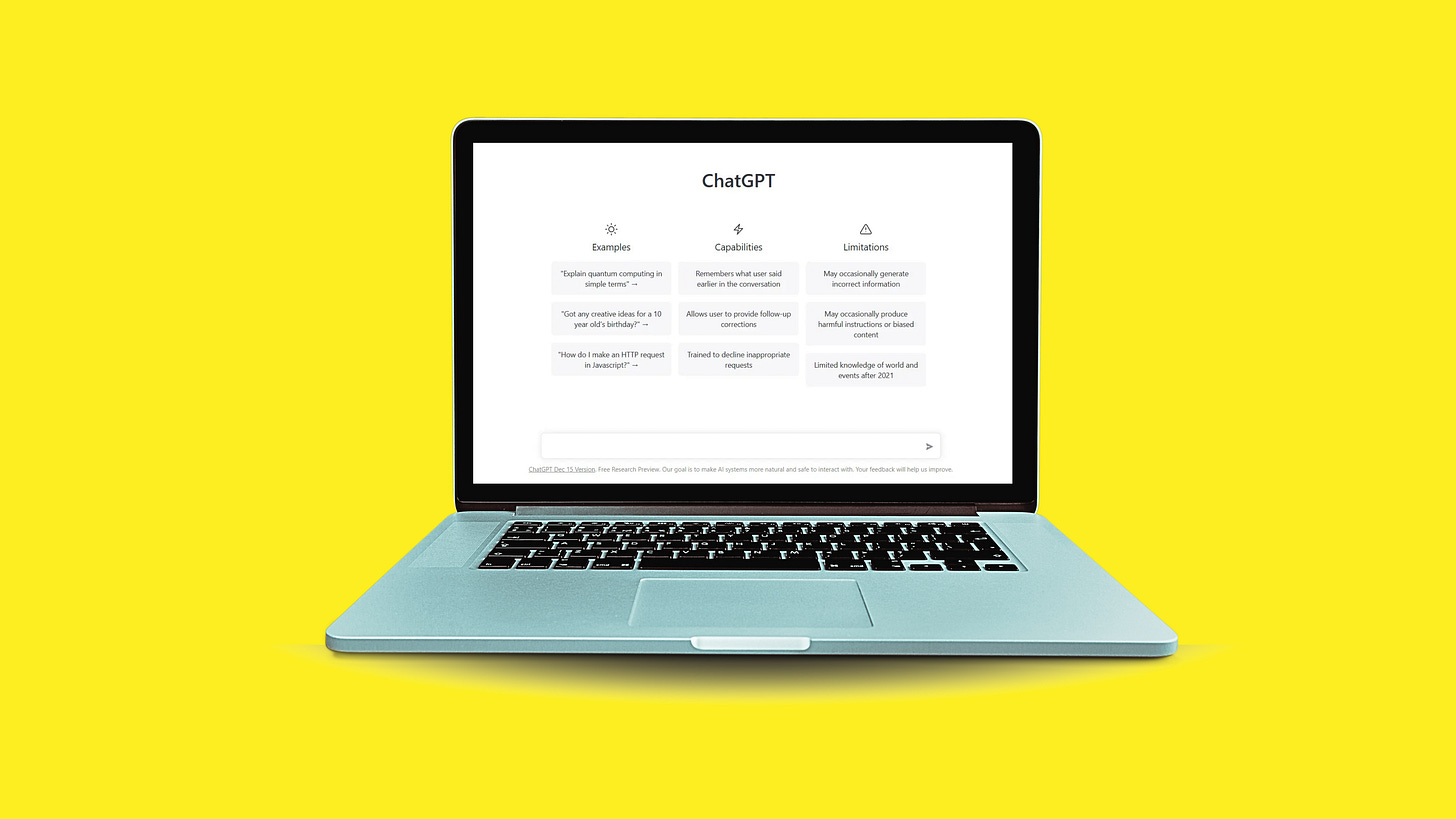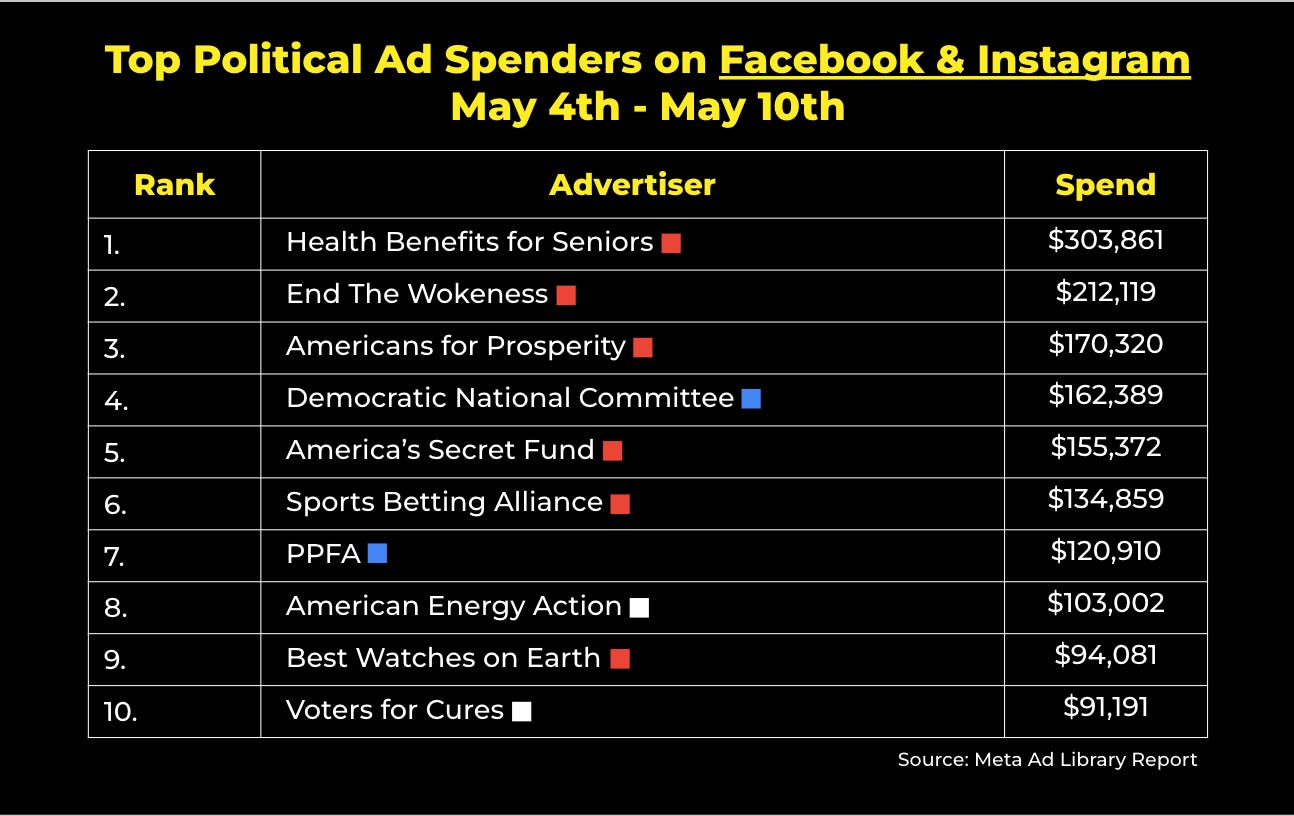AI Isn’t Coming – It’s Here
Also inside: TikTok adds conservative voices to their US leadership, who’s in + who’s out in campaign tech world, and more
This newsletter is brought to you by the donor acquisition approach that helps you turn $1 into $2.
This week, I spoke to Maya Hutchinson, Obama 2012 and DNCC alum and CEO of Battleground AI, about how AI is transforming online campaigning and how candidates should maneuver this ever-changing, fraught tech landscape.
More on that below, but first…
Digital ad spending, by the numbers:
FWIW, U.S. political advertisers spent about $9.6 million on Facebook and Instagram ads last week. Here were the top ten spenders nationwide:
If you’re confused about seeing a disclaimer called Best Watches on Earth on the top chart, I’ll give you one guess, just by the name, of who’s behind it… Donald Trump seems to have licensed his brand to this company, which was the subject of a CNN investigation. The company spent $94,000 this past week running Facebook and Instagram video ads that feature what seems to be a direct-to-camera ad that Trump appears to have recorded for them.
Meanwhile, political advertisers spent just over $2.1 million on Google and YouTube ads last week. These were the top ten spenders nationwide:
The Republican-aligned nonprofit American Action Network spent $77,600 on new Google + YouTube ads that attack Democratic members of Congress in vulnerable districts and allege that they voted no to protecting Medicare. (The actual issue at play here seems to be the highly controversial Biden-era “pill penalty”).
On X (formerly Twitter), political advertisers in the U.S. have spent around $3 million on ads in 2025. According to X’s political ad disclosure, here are the top spenders year to date:
…and lastly, on Snapchat, political advertisers in the U.S. have spent around $795,700 on ads in 2025. Here are the top spenders year to date:
Project Unloaded launched new Snap ads specifically targeting teens aged 13-17 that use Gen-Z-friendly formats to urge them not to have guns around when going through mental health struggles.
Tired of burning money with Care2 or Meta ads?
It’s 2025, and groups like Common Cause, Earthjustice, and Amnesty International are leaning on Civic Shout to acquire ROI-positive donors and activists. See how you can, too.
AI Isn’t Coming – It’s Here
This week, I spoke to Maya Hutchinson, CEO of Battleground AI, about how AI is transforming online campaigning and how candidates should maneuver this ever-changing, fraught tech landscape. The following interview has been edited for clarity and concision.
LR: AI is probably the biggest buzzword of this year, but a lot of people still seem to be pretty confused and also pretty afraid of it. So, first and foremost, can you walk us through what your model for AI actually does and how it works for campaigns?
MH: AI is a tool, just like your computer or phone. Out of the box, you can experiment with Chat GPT and ask it questions. But it's a generalist tool, right? So what we need to think about is: how do we take that underlying technology and that really powerful, large language model and apply it to our use cases? And you can only do that if you deeply understand what problem you're trying to solve.
We developed Battleground AI from a deep understanding of digital advertising, and over many years of consistently seeing the same challenges, but not having a clear solve.
AI was that unlock, where it was like finally, there is actually a tool that's accessible, that we can take and apply to the challenges we face. And there are two main challenges here: We are faced with more platforms where we need more advertising, but we're seeing declining results with rising costs and lower performance. And at the same time, as experts in the space, you're under more and more pressure from people to perform – ads have to do better, but people have less time and fewer resources.
LR: I know you guys launched Battleground AI last year. Do you have any examples you can share of how you implemented it at the peak of a campaign cycle?
MH: Yeah, so it was in two main places. There's a lot of opportunity in smaller races: taking someone who didn't think that they had enough resources to run ads, let alone on multiple platforms, and we were able to be that unlock to tell them they can create content in a sustainable and effective way for much cheaper.
And, the second – well, I think it’s important to emphasize that this work is a combination of humans and AI. It does not mean you’re cranking out tons of content and never reviewing it. And one of our users conducted a three-state 400-ad research study, which looked at three sets of content: one just generated on our AI platform, one just generated by humans, and then the combination of both. What that research proved and reiterated, which I think we intuitively know, is that with humans and AI, we are better together.
LR: Along those lines, what do you see as the biggest and most important things that can be accomplished with AI in the future – and, on the flip side, what are your biggest concerns?
MH: Just like the internet, I think AI is going to change the way organizations operate, soup to nuts.
From a campaign perspective, small races have a much bigger opportunity because of AI. Candidates and campaigns want to talk to their agency people – but those people are continually running out of time and space. I think AI is a big industry unlock that, if anything, emphasizes the importance of humans and can free up their time for that human interaction.
I do think there are some concerns we need to take seriously about AI, from a policy and regulation standpoint, to the environment, to copyright. We don’t want to necessarily pre-regulate anything – but, ultimately, we need to remember that social media is just a reflection of our own society, and so is AI. It's a tool we've created as humans. So, we, as humans, need to take responsibility for how it acts.
LR: Pivoting over to the chaos going on in the Democratic digital sphere: NGP Van is breaking, ActBlue is a target of the Trump administration, and it’s all looking pretty rough. In general, what do you think Democrats should be doing to address these issues?
MH: Democrats used to be the party of experimentation and innovation, and we were always at the forefront. We can't continue to be the party that's afraid of finding new ways to talk to people, of breaking out of a structured playbook. The playbook is still kind of the Obama playbook – I was on the Obama campaign, and it’s been quite a while since then.
Rather than thousands of text messages and constant asks for money, we need to think about – and I think AI will help with this – how we engage people with a long-term, sustainable communication strategy.
LR: Those were all of my questions! But I always like to give folks the last word. Any final piece of wisdom?
MH: I would just continue to encourage people to experiment in even small ways with all the new tools we have. You can look to other industries too – beauty and sports are great examples.
Especially anyone who’s sitting in a digital director seat or an agency seat this cycle, always be curious – don’t be complacent, because this space is just moving way too fast.
Tired of burning money with Care2 or Meta ads?
It’s 2025, and groups like Common Cause, Earthjustice, and Amnesty International are leaning on Civic Shout to acquire ROI-positive donors and activists. See how you can, too.
More from around the internet:
It’s been a big couple of weeks for my team over at COURIER! We’ve launched a few new products, be sure to check them out:
Grave Injustice is a new weekly newsletter from legal expert Lisa Graves unpacking everything you need to know about what’s going down in SCOTUS and in the courts
Below The Beltway is the first EVER daily newsletter from COURIER written by our own Camaron Stevenson tracking what – and who – you need to keep your eyes on and how you can take action
And finally… we just released the trailer for COURIER’s first ever mini docuseries called REPRESENT, following activist + Gen Z influencer Deja Foxx as she runs for Congress in her home district in Arizona
Some more very cool developments in political tech: the Higher Ground Institute just dropped their 2024 political tech landscape report, and Morning Consult dropped an AI tool where you can see comprehensive survey results about brands, and it’s WILD.
TikTok has apparently switched up its eight-person US content council to add more conservative and libertarian voices (including David Inserra, formerly of the Heritage Foundation).
Our weekly clips round-up is back! Every Tuesday, paid subscribers will get a debrief on the stories about politics, tech, social media, media, and journalism you need to be tracking. If you haven’t signed up yet, you can right here ⬇️
That’s it for FWIW this week. This email was sent to 24,329 readers. If you enjoy reading this newsletter each week, would you mind sharing it on X/Twitter, Threads, or Bluesky? Have a tip, idea, or feedback? Reply directly to this email.









